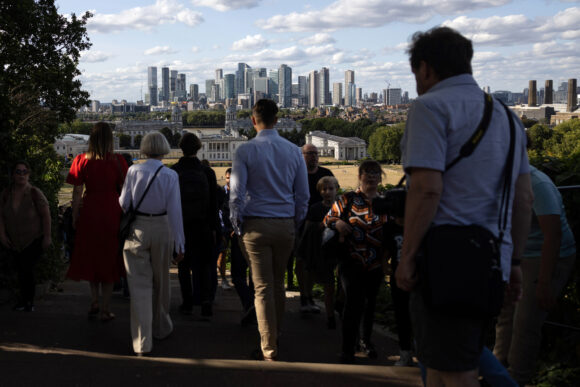Threats to the UK from Russia and Iran and the danger posed by the Islamic State group have increased in recent months, according to the head of Britain’s domestic spy agency.
Ken McCallum, the director-general of MI5, said the security service faces “stretched” resources as it grapples with the domestic fallout from Russia’s war in Ukraine, the conflict between Israel, Iran and its proxies in the Middle East as well as Islamist terror groups seeking to capitalize on the turmoil.
“The decisions MI5 has to take on allocating our finite capacity are harder than I can recall in my career,” McCallum said in a rare public speech at the UK’s Counter Terrorism Operations Centre in London on Tuesday. He cited Russia’s military intelligence service, the GRU, in particular as engaging in a “sustained mission to generate mayhem on British and European streets.”
The number of MI5 investigations focused on foreign state-based threats in the UK had increased by 48% in the last year, he said, adding that Iran was copying Russia’s tactics of paying criminals in Britain to carry out acts of aggression and intimidation. That activity had intensified in the last year and the Kremlin was finding ways to “adapt” its methods, McCallum said in response to a question from Bloomberg, adding he would provide details at a later date.
Since January 2022, MI5 had responded to 20 potentially lethal plots on British soil that were backed by the Iranian state, he said, noting that UK spies had seen “similarities” between Russian and Iranian efforts on hybrid warfare.
“If you take money from Iran, Russia or any other state to carry out illegal acts in the UK, you will bring the full weight of the national security apparatus down on you,” he warned. “It’s a choice you’ll regret.”
McCallum also said the UK saw a “worsening threat” from al-Qaeda and Islamic State. Though neither is the force they once were, Islamic State in particular had “resumed efforts to export terrorism,” he said.
In the last month, more than a third of the MI5’s highest priority investigations were connected to overseas terror groups, he said. McCallum also said about one in eight people investigated for terror activity in the UK are under the age of 18, a statistic he described as “staggering.”
Britain’s overall terror threat level remains at “substantial,” meaning an attack is considered likely.
The MI5 chief spoke about the risk posed by China in the UK, characterizing it as “different” to Russia and Iran, and something to be managed alongside economic ties with Beijing.
Businesses and academia should seek guidance from the government on how to ensure they were resilient against attempts by Chinese state-backed groups to obtain “valuable information,” he said. The UK and its allies “should expect further testing and in places defeating” of their cyber defenses, he added.
Commenting on the tension between companies offering end-to-end encryption and the needs of law enforcement to access criminals’ messaging, McCallum urged both sides to avoid “absolutist positions.”
The counter-terrorism agencies of the so-called Five Eyes Intelligence partners — the UK, US, Australia, Canada and New Zealand — are working together at the London operations center, he said, describing it as something that “would have been unimaginable a generation ago.”
Photograph: Visitors at a viewing spot overlooking the Canary Wharf district in London. Photo credit: Chris Ratcliffe/Bloomberg
Was this article valuable?
Here are more articles you may enjoy.



 AI Claim Assistant Now Taking Auto Damage Claims Calls at Travelers
AI Claim Assistant Now Taking Auto Damage Claims Calls at Travelers  AIG’s Zaffino: Outcomes From AI Use Went From ‘Aspirational’ to ‘Beyond Expectations’
AIG’s Zaffino: Outcomes From AI Use Went From ‘Aspirational’ to ‘Beyond Expectations’  Fla. Commissioner Offers Major Changes to Citizens’ Commercial Clearinghouse Plan
Fla. Commissioner Offers Major Changes to Citizens’ Commercial Clearinghouse Plan  Judge Tosses Buffalo Wild Wings Lawsuit That Has ‘No Meat on Its Bones’
Judge Tosses Buffalo Wild Wings Lawsuit That Has ‘No Meat on Its Bones’ 

